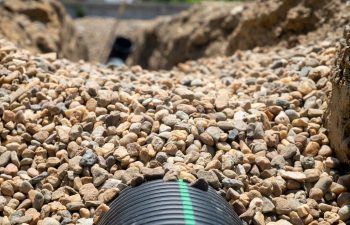Flooding and My Drain Field

As summer storms become more intense in Georgia due to changing weather patterns, residents of Alpharetta and surrounding areas are grappling with the effects of excessive rainfall, hurricanes and flooding. These severe weather events can wreak havoc on many aspects of home maintenance, but one area of particular concern is the drain field of septic systems. Understanding the relationship between flooding and your drain field is essential for maintaining a healthy septic system and ensuring the long-term functionality of your home’s waste management.
Recent Weather Patterns in Georgia
In recent years, Georgia has experienced significant weather variations, including heavy rains and hurricane impacts that have led to localized flooding. This excessive moisture creates an overwhelming situation for septic systems, particularly for those with drain fields that may already be struggling under normal conditions. According to the National Weather Service, parts of Georgia have experienced rainfall levels well above the seasonal average, which can saturate the soil surrounding your septic system and lead to drainage issues.
How Flooding Affects Your Drain Field
A drainage field, or drain field, functions as the final treatment step for effluent from your septic tank. It allows effluent to be absorbed by the soil, where it is filtered naturally. However, flooding can hinder this process. Here’s how flooding impacts your drain field:
- Soil Saturation: When the soil becomes overly saturated, it loses its ability to absorb additional liquid. This can lead to backups and surface pooling, which may indicate a compromised drain field.
- Blockage of Pipes: Floodwaters can carry debris and sediment that may infiltrate the pipes leading to your drain field. This blockage can lead to major issues, including backups in your home.
- Erosion: Heavy rains can cause soil erosion around your drain field, potentially exposing pipes or leading to misalignment, which affects the system’s functionality.
- Contamination: Floodwaters can introduce harmful contaminants into the soil, which poses a risk to your septic system, property, and nearby water sources.
- Increased Risk of Failure: Prolonged flooding can weaken the overall structure of the drain field, leading to a higher chance of a complete system failure, which is costly and inconvenient.
Repair Solutions from Septic Service Pro
At Septic Service Pro, we understand the unique challenges that flooding poses to your drain field. Our team of highly skilled septic specialists is dedicated to helping Alpharetta residents manage their septic systems efficiently. While some may assume that a flooded drain field necessitates a complete replacement, we pride ourselves on our ability to often provide effective repairs, saving you time and money.
Our approach involves a comprehensive evaluation of your septic system to identify the root causes of the issues exacerbated by flooding. More often than not, repair solutions can include:
- Soil Aeration: This helps to increase oxygen flow and promote the natural filtration processes of the soil.
- Drainage Improvements: Installing additional drainage systems can help redirect excess water away from your drain field.
- Cleaning and Maintenance: Regular maintenance can help prevent the buildup of debris in pipes and improve overall system performance.
Our commitment to quality service ensures that we can assist you no matter the issue you may be facing. As licensed specialists in septic systems, our knowledge and expertise mean we can handle everything from routine inspections to emergency repairs.
Drain Field FAQs
Here are some common questions regarding drain fields and flooding:
How can I tell if my drain field is failing?
Lush, wet areas, foul odors or backups in plumbing fixtures are signs of a failing drain field. If you notice any of these issues, contact a septic professional immediately.
Can heavy rain alone cause damage to my drain field?
Yes, excessive rainfall can lead to soil saturation, which affects your drain field’s ability to treat wastewater properly.
What should I do if my drain field becomes flooded?
Avoid using water-intensive appliances and contact a septic service professional for an assessment.
How often should I have my septic system inspected?
It’s recommended to have your septic system inspected at least once a year to catch any issues early.
Can flooding lead to contamination of my drinking water?
Yes, if floodwaters carry contaminants into the groundwater, it could affect your drinking water quality, so it’s critical to have your water tested following a flood event.
Alpharetta Drain Field Repair
While flooding and heavy rains can pose serious challenges to your septic system’s drain field, Septic Service Pro is ready to support you with our reliable expertise and dedicated service. Remember, a proactive approach ensures the health of your septic system, helps prevent costly repairs, and protects your home and the environment. If you’re experiencing problems with your drain field, contact Septic Service Pro today for a thorough assessment and effective solutions.

